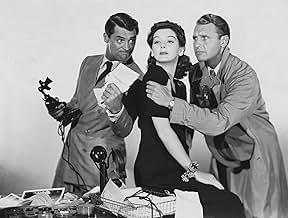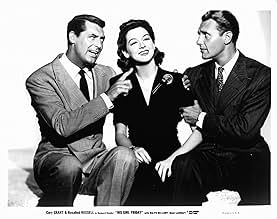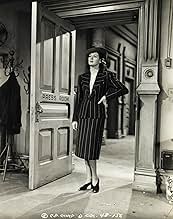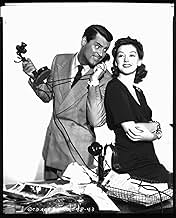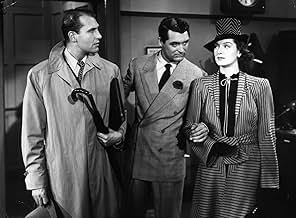A newspaper editor uses every trick in the book to keep his ace reporter ex-wife from quitting and remarrying, using an exclusive interview with a death row convict as an enticement to buy h... Read allA newspaper editor uses every trick in the book to keep his ace reporter ex-wife from quitting and remarrying, using an exclusive interview with a death row convict as an enticement to buy himself some time to win her back.A newspaper editor uses every trick in the book to keep his ace reporter ex-wife from quitting and remarrying, using an exclusive interview with a death row convict as an enticement to buy himself some time to win her back.
- Awards
- 2 wins & 1 nomination total
Storyline
Did you know
- TriviaOne of the first films (preceded by Stage Door (1937)) to have characters talk over the lines of other characters, for a more realistic sound. Prior to this, movie characters completed their lines before the next lines were started.
- GoofsWhen Bruce Baldwin comes to the press room late in the movie, an electric fan and small shelf on the wall to the left of the door both completely disappear. Both have been there in all previous scenes and both reappear after this scene.
- Quotes
[describing Bruce]
Walter Burns: He looks like that fellow in the movies - Ralph Bellamy.
- Crazy creditsOpening credits prologue: It all happened in the "Dark Ages" of the newspaper game--when to a reporter "Getting that story" justified anything short of murder.
Incidentally you will see in this picture no resemblance to the man and woman of the press today.
Ready?
Well, once upon a time - -
- ConnectionsEdited into This Is It (2009)
Featured review
Charles McArthur and Ben Hecht met when both were reporters in Chicago during the 1920s. They created two of the funniest farces in American drama, TWENTIETH CENTURY (about theater people) and THE FRONT PAGE. The latter was based on their experiences as news reporters in those crazy days in Chicago, where the newspapers concentrated on sensationalism and the politics was thoroughly corrupt. The resulting play is hysterically funny and yet remains timely. For all the exaggeration of how Walter Burns and Hildy Johnson manipulate police, politicians, reporters, and civilians to get their scoop, the story remains relevant for several reasons. The political balance in a big Mayoralty election is precarious due to the Earl Williams case. Williams has shot a policeman who is African-American, a big local voting block, and they want him punished. The corrupt Mayor and his idiot jail warden are willing to execute him for the votes needed to stay in office, but the Governor (who is from the rival party) believes the killer is insane (or at least mentally deficient). So already (as you see) race, politics, and the validity of the death penalty get pulled in. Soon we also see examples of nepotism and corruption in the police, and City Hall, cynical politics based on a man's life, and questions about privacy and a free press. For a play from 1931 this one still has relevance.
There had been an earlier version of the play in the 1930s called THE FRONT PAGE, starring Adolphe Menjou as the conniving and devious Walter Burns, and Pat O'Brien as ace reporter Hildy Johnson. It is a good version, and both stars do well with their parts (and both have the verbal speed necessary for the dialog to flow over the ears of the audience). But when the film was remade in 1940, Howard Hawks decided to redraw Hildy Johnson into a female reporter (and previous wife) of Burns. His casting of Cary Grant was radically different too. Burns is a nasty, conniving s.o.b. who would kill for a good story. Menjou was somewhat dapper (he was usually dapper) in the role, but the hardness under the presentable shell was there. And by changing Hildy from a guy to a gal, and Walter's former wife, you had to make Walter look more interesting. So Walter is turned into Cary Grant. There was a search for Hildy, involving Jean Arthur and Irene Dunne as possibilities. Neither ended up playing him. Instead it went to Rosalind Russell.
It has to be admitted Russell had the vocal abilities to push the dialog at the proper clip. Possibly Jean Arthur could have done that just as well, but Arthur did not have the apparent physical strength behind the stylishness that Russell showed. She really does balance well (in this film) with Grant, given their characters.
Motivation changes a little. This Walter Burns still wants to get his scoops, but there are moments of fragility when he realizes he may forever lose Hildy to her fiancé Bruce (the ever helpless Ralph Bellamy). And they oddly work (Hawks manages to keep them under control). Also, as the story is now twelve years older than the original play, certain changes occur in Walter's political views. He does dislike the gang (led by Clarence Kolb and Gene Lockhart) running the city, and points out to Hildy that they have a chance to help give the city the sort of government New York City has under La Guardia. This does not end his joy at scooping the opposition, but it does suggest that Burns has more depth.
It is now generally believed that this is the best of the film versions of THE FRONT PAGE, and one of the funniest films ever made. The entire cast shines (look at the scene where Helen Mack confronts the reporters who have made her look like a tramp, and have told lies about John Qualen (Williams) - she is in a state when Russell takes her out of the press room, and the reporters are thoroughly ashamed of herself - and Russell comes back looking at Regis Toomey, Porter Hall, and the others, and says "Gentlemen of the Press!" with heavy cynical irony). And also note Billy Gilbert's immortal Joe Pettibone, the most hopeless monument of total befuddlement in movies. It is one of the few film comedies of that period that retains it's laughs one viewing following another.
There had been an earlier version of the play in the 1930s called THE FRONT PAGE, starring Adolphe Menjou as the conniving and devious Walter Burns, and Pat O'Brien as ace reporter Hildy Johnson. It is a good version, and both stars do well with their parts (and both have the verbal speed necessary for the dialog to flow over the ears of the audience). But when the film was remade in 1940, Howard Hawks decided to redraw Hildy Johnson into a female reporter (and previous wife) of Burns. His casting of Cary Grant was radically different too. Burns is a nasty, conniving s.o.b. who would kill for a good story. Menjou was somewhat dapper (he was usually dapper) in the role, but the hardness under the presentable shell was there. And by changing Hildy from a guy to a gal, and Walter's former wife, you had to make Walter look more interesting. So Walter is turned into Cary Grant. There was a search for Hildy, involving Jean Arthur and Irene Dunne as possibilities. Neither ended up playing him. Instead it went to Rosalind Russell.
It has to be admitted Russell had the vocal abilities to push the dialog at the proper clip. Possibly Jean Arthur could have done that just as well, but Arthur did not have the apparent physical strength behind the stylishness that Russell showed. She really does balance well (in this film) with Grant, given their characters.
Motivation changes a little. This Walter Burns still wants to get his scoops, but there are moments of fragility when he realizes he may forever lose Hildy to her fiancé Bruce (the ever helpless Ralph Bellamy). And they oddly work (Hawks manages to keep them under control). Also, as the story is now twelve years older than the original play, certain changes occur in Walter's political views. He does dislike the gang (led by Clarence Kolb and Gene Lockhart) running the city, and points out to Hildy that they have a chance to help give the city the sort of government New York City has under La Guardia. This does not end his joy at scooping the opposition, but it does suggest that Burns has more depth.
It is now generally believed that this is the best of the film versions of THE FRONT PAGE, and one of the funniest films ever made. The entire cast shines (look at the scene where Helen Mack confronts the reporters who have made her look like a tramp, and have told lies about John Qualen (Williams) - she is in a state when Russell takes her out of the press room, and the reporters are thoroughly ashamed of herself - and Russell comes back looking at Regis Toomey, Porter Hall, and the others, and says "Gentlemen of the Press!" with heavy cynical irony). And also note Billy Gilbert's immortal Joe Pettibone, the most hopeless monument of total befuddlement in movies. It is one of the few film comedies of that period that retains it's laughs one viewing following another.
- theowinthrop
- Mar 7, 2006
- Permalink
Details
- Release date
- Country of origin
- Languages
- Also known as
- Howard Hawks' His Girl Friday
- Filming locations
- Production company
- See more company credits at IMDbPro
Box office
- Gross US & Canada
- $296,000
- Runtime1 hour 32 minutes
- Color
- Aspect ratio
- 1.37 : 1
Contribute to this page
Suggest an edit or add missing content




